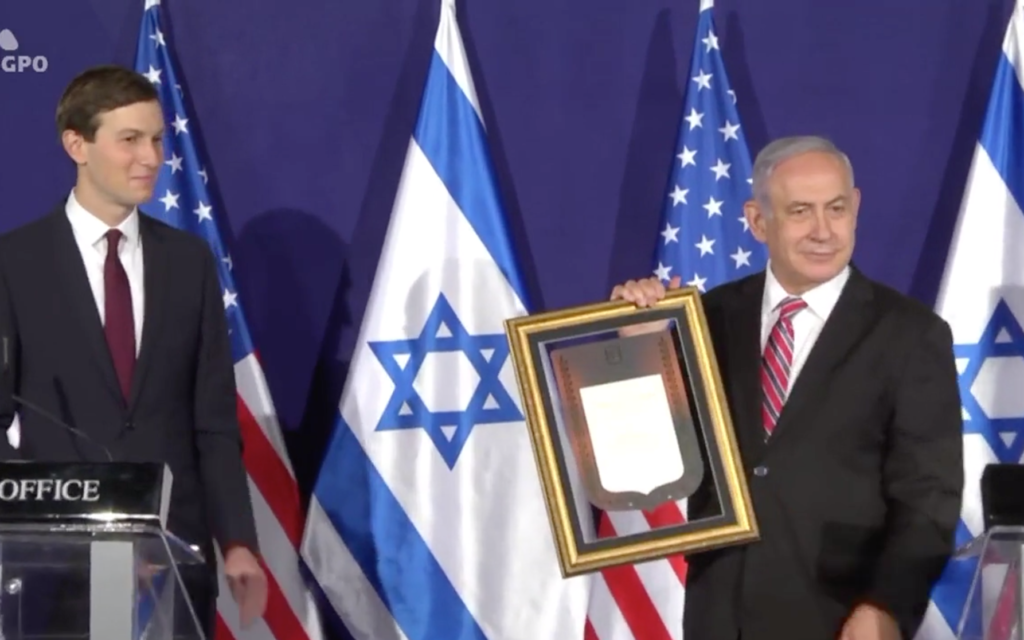
Jared Kushner, son-in-law of former US President Donald Trump, reveals in an upcoming book that when Trump decided to recognize Jerusalem as Israel’s capital and move the US embassy there in 2017, then-Israeli Prime Minister Benjamin Netanyahu’s reaction was decidedly lukewarm, according to straight ahead.
Citing excerpts from the book posted online by a Saudi official, the outlet reported that, according to Kushner, Netanyahu’s kind response nearly sabotaged the plan.
Kushner’s book “Breaking History: A White House Memoir” is due for publication on August 23.
The book reportedly stated that in a phone call prior to the official announcement, Trump informed Netanyahu of the move, but the former prime minister replied simply: “If you choose to do it, I will support you.” Kushner wrote that confused Trump, anticipating a profuse reaction, repeated himself, to which Netanyahu responded again with “less enthusiasm than expected.”
Trump began to question his decision… [he] He wondered aloud why he would take this risk if the Israeli prime minister didn’t think it was important,” Kushner wrote, claiming Trump told the former prime minister, “Bibi, I think you’re the problem.”
Netanyahu “responded calmly,” explaining that he was part of the solution. However, Kushner wrote that he could see that Trump was clearly “disappointed.”
Kushner did not appear to say why he thought Netanyahu responded as he did.
A statement from Netanyahu’s office said that “Contrary to the allegations, Prime Minister Netanyahu, who has asked President Trump to move the embassy several times, highly appreciates this decision.
Before making the decision, President Trump told Prime Minister Netanyahu: “Some of my people are saying that this move would be dangerous for the United States. What’s your opinion?’ Netanyahu responded that he did not see any real danger and there was no reason not to move the embassy.
“It is doubtful that the embassy would have been moved if Netanyahu had responded to the president otherwise.”
Jerusalem has been the capital of Israel since its founding in 1948, although not recognized by much of the international community, as in the initial United Nations partition plan, Jerusalem was to be an international city.

Senior Adviser to US President Jared Kushner (right) speaks as US Ambassador to Israel David Friedman looks on at the official opening ceremony of the US Embassy in Jerusalem, May 14, 2018 (Yonatan Sindel/Flash90)
Trump formally recognized Jerusalem as Israel’s capital in December 2017, when he announced plans to move the embassy there. In May 2018, his administration inaugurated the new facility – a move that was met with intense controversy, both in Washington and the Middle East.
After the move, the Palestinians, who claim East Jerusalem as the capital of their future state, cut ties with Washington, describing the Trump administration as biased towards Israel.
At the time, Trump said the decision was made to advance US interests and peace in the region, and out of respect for Israel’s sovereignty.
Kushner’s book also revealed that Trump was upset by a three-hour extended meal he attended with Netanyahu during his visit in 2017.
“It was nice, but every time I thought the meal was going to end, another course would come out,” Trump apparently told Kushner, complaining that the then prime minister was “talking my ear.”
Netanyahu and Trump maintained a good relationship throughout their time in office, until Trump felt it betrayal Written by Netanyahu When he congratulated current US President Joe Biden on his election victory in 2020.
Kushner is married to Trump’s eldest daughter Ivanka and has served as a White House adviser. He played an important role in the previous administration’s Middle East policy, participating in a diplomatic push that led to the Ibrahim Accords – a peace deal that led to Israel establishing diplomatic relations with the United Arab Emirates, Bahrain and Morocco.
Times of Israel staff contributed to this report.

“Travel specialist. Typical social media scholar. Friend of animals everywhere. Freelance zombie ninja. Twitter buff.”







More Stories
Taiwan is preparing to face strong Typhoon Kung-ri
Israel orders residents of Baalbek, eastern Lebanon, to evacuate
Zelensky: North Korean forces are pushing the war with Russia “beyond the borders”